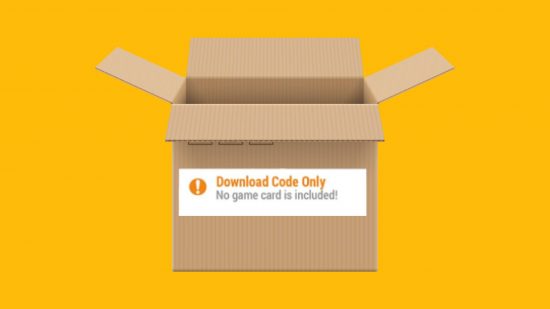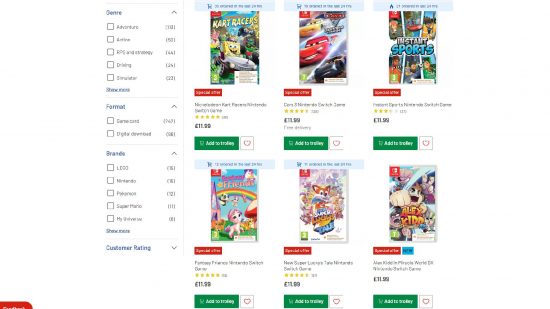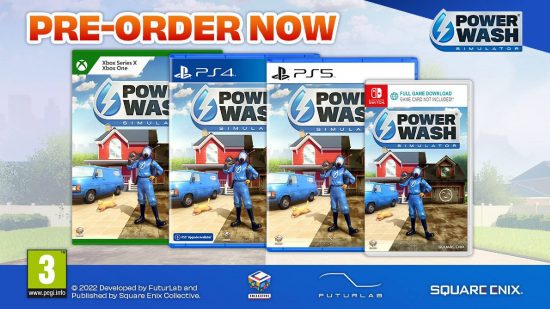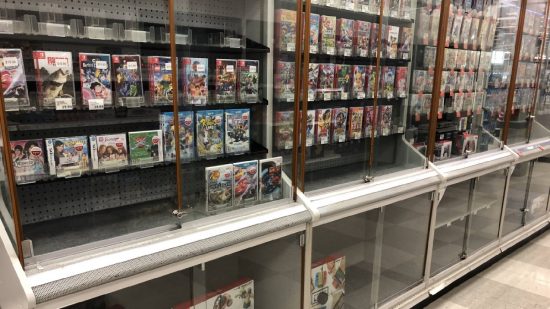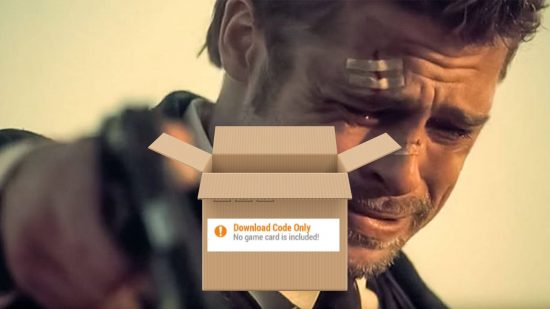I am – and have been for years – a Nintendo collector. I like my physical bits and bobs, I love my shelves of amiibo, and I absolutely adore the feeling of a new game turning up in the post. I love the feeling of opening up the packaging, looking at it from every angle, and popping a cartridge into my Switch.
Now, I also buy a lot of digital games because I’m impatient. So one thing I really enjoy is when smaller titles get a physical release down the line. I’ve got gorgeous boxed copies of games like A Short Hike, Mundaun, Hollow Knight, and Scott Pilgrim vs The World that I cherish. I get that not every game can afford the printing and distribution process, so it’s nice when it happens.
Sadly, there’s another option, and it’s one I hate with a burning passion. If you own a Nintendo Switch and look online for games, you may come across the dreaded words ‘digital download code included’ and feel a sad wave of disappointment wash over you. Publishers often want their games on shelves but don’t want to pay for the cartridge costs, so we have something known as the code in a box.
For some releases, it’s a supplemental aspect, such as offering different games in a collection. My copy of The Bioshock Collection for Switch includes the first Bioshock on the cartridge, but if I want to play the next two entries, I’m using a download code. Similarly, the physical release of Final Fantasy X and X2 only includes the former of those two on the cart, while Yuna’s follow-up adventure is a download code included in the box.
I get it. There’s a limit on how much data can fit on a Nintendo Switch cartridge, and only in very rare cases is Nintendo willing to not only work with a developer to offer a larger cartridge but also help with compression to include all of a game into that single physical release. The Witcher 3: Wild Hunt is one such miracle release with all of the game and all of its DLC included in the physical edition. But, it’s pretty clear that Nintendo and CDProjectRed swallowed the cost of this because they know there’s a demand for the title.
Now finally, we land on the most egregious type of code in a box. An empty box on a store shelf, with nothing but a download for the entire game inside that plastic shell. No cartridge, nothing. You might think this doesn’t happen often, but here are some notable releases, either upcoming or recently released that are strictly a code in a box.
- Power Wash Simulator
- OlliOlli World
- Lego 2K Drive
- Nickelodeon Kart Racers
- Just Dance 2023
- New Super Lucky’s Tale
- Monopoly for Nintendo Switch
- Nerf Legends
- GRIP Combat Racing
This is also just a small selection, as there are countless examples hidden among store shelves. Now, cartridge production is likely more difficult than disc production for other consoles, but what do I know? Plus, while Switch cartridges can technically go up to 64GB, the increased cost of production likely puts off many developers. There are no concrete details on the cost of producing a 16GB cartridge compared to a 32GB, but increased costs are almost certain.
There is a very clear reason for the code in a box, and it is real estate on store shelves. When it comes to the holiday period, many publishers are likely banking on confused parents or grandparents wandering into brick-and-mortar stores and grabbing the first game they see for Nintendo Switch. It’s understandable, but do we need to produce plastic boxes to do so?
It’s up to retailers to point consumers in the right direction, and instead of the huge amount of plastic and energy needed to create and ship these empty boxes, can we have stalls for them in the shops and then perhaps a way of dispensing codes at the till? If you need people to see your game, maybe bring back the demo unit, or send in a display stand.
Now I know there’s no easy answer, and most things require some sort of printing, or energy expenditure to deliver them. But the code in a box is a huge waste of resources, not to mention the many people buying the box and assuming there is a cartridge in there. Not every publisher or developer is capable of affording the cartridge printing costs, and perhaps some games are too big to fit on the cartridge size they can afford. But then, maybe just don’t fill store shelves with empty boxes!
Certain online retailers are plagued by the code in a box, with the UK-based shop Argos being a particularly big offender. Yes, it says “download code only” in a box in the corner, but you can be sure that many consumers miss that when the game icon is shrunk on a phone screen. It’s not clear in the listings, and for anyone with any sort of visual impairment, there is just a small “Digital download.” snuck into the bottom of the item description.
Whether it’s morally correct to sell them online is one argument, and while I’m sure some people buy digital download codes when they are hoping for actual physical games, nothing illegal is happening. It’s just a source of frustration that they take up so much space, and when it’s only a download code, why do we need to print, ship, and then order and once again ship an empty box? The eShop exists for a reason, and it’s cutting out all of this hassle.
Finally, environmentally I have to say I frown upon publishers and developers who agree to the code in a box. With bigger publishers like Ubisoft, it’s little surprise that they feel the need to dominate shelf space, whether there is any cartridge in the box or not. But the recent examples such as Power Wash Simulator and OlliOlli World particularly rub me the wrong way.
Neither game is a huge download on the Switch, and both have fairly large publishers behind them. It seems like either a rush to get the game to store shelves or just laziness and the environment is the one paying the price. The video game industry is going to have to reckon with its addiction to plastic one day, but at least cartridges and their packaging serve a function.
Whatever the next Switch is, I hope Nintendo works to allow smaller developers and publishers an easier way to get their games on a cartridge. I’m sure a lot of devs want their game printed physically, but costs, timing, or other factors stand in the way. Perhaps even production issues around COVID are an issue, so with any luck, things are set to be easier in the near future.
What I do know for now, is that consumers need to keep their eyes peeled, and publishers need to offer solutions. Whether it is getting a download code on a receipt from a physical store, better visibility on the eShop, or perhaps cardboard boxes on store shelves, anything has to be better than shelves, warehouses, and gamer’s homes filled with sad, empty boxes and nothing to show for it.
While we have you, if you need some more gaming in your life, be sure to check out our guides to the best alien games and the best horror games next.
